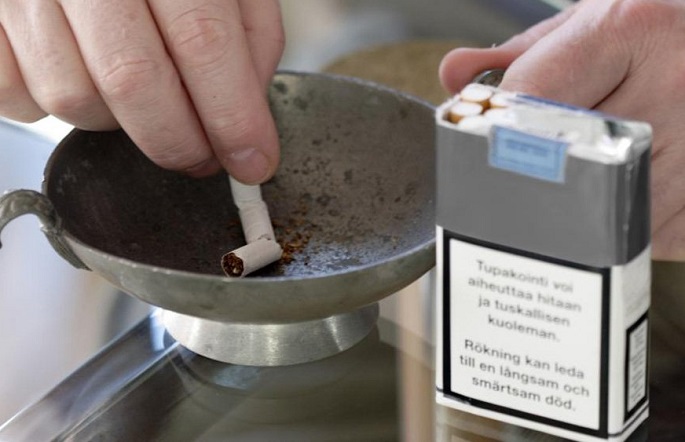Working group for "Smoke-free Finland" tobacco policy
Published : 01 Jun 2018, 03:08
Updated : 01 Jun 2018, 03:15
A working group, appointed by the Ministry of Social Affairs and Health, proposed a road map for ending the use of tobacco and other nicotine products in Finland by 2030, said an official press release.
The working group submitted its report to Minister of Family Affairs and Social Services Annika Saarikko on Thursday, May 31, the World No Tobacco Day.
It would mean that less than 5% of the adult population use tobacco and nicotine products daily. Reaching this goal, recorded in the Tobacco Act, requires that the future governments monitor and assess tobacco policy and develop new measures.
The working group proposes amendments to legislation and taxation, more extensive smoke-free environments, support for smoking cessation, higher age limits, more extensive smoking bans, greater restrictions on passenger imports and more efficient monitoring of the use of tobacco and nicotine products. It proposes that these measures be implemented at the start of the next electoral term.
“The working group has several interesting proposals, such as the proposal to enhance the prevention of tobacco product use, including snus use, in youth work and in young people’s sports activities and other free-time pursuits. Another important initiative is that workplaces and occupational healthcare should better support people to quit smoking,” Saarikko said.
Director Ilkka Oksala, who chairs the working group, said that smoking will not end by 2030 without truly effective new measures.
“It is also important to prevent people from switching from smoking to snus or other new tobacco products that keep emerging on the market. These products, too, are highly dangerous to health,” Oksala said.
The working group proposes the introduction of plain product and packaging rules for products, tobacco product packaging, nicotine-containing liquids and refill containers. These rules would reduce the possibilities of using such products and/or their retail packaging as a means of marketing products that are harmful to health.
The working group proposes that the excise duty on tobacco products be raised in the future government terms at least at the same rate as during this term. The price of a pack of mid-priced cigarettes is estimated to increase by around EUR 2.50 following tax raises in 2016–2019. By 2020, the average price of a pack of cigarettes would be about EUR 8.20, the share of taxes being EUR 5.60.
The working group further proposes a review of the possibilities of imposing taxes on non-tobacco nicotine products under the Tobacco Act.
The working group proposes that tobacco products, nicotine-containing liquids and nicotine-containing tobacco substitutes may not be sold or otherwise supplied or passed on to persons under the age of 20 years. The same minimum age is proposed for the import and possession of the products.
The working group would ban smoking and use of other tobacco products in premises where minors spend time, such as playgrounds and beaches. Smoking bans would cover even public transport stops, platforms and taxi ranks. The working group further proposes that public-sector operators, such as local governments, protect people against exposure to tobacco smoke by restricting smoking on market squares, for example.
The working group proposes that the Limited Liability Housing Companies Act be amended so that housing companies could ban smoking on balconies or indoors in facilities controlled by residents by a majority vote.
The working group proposes that the sanction for violating a smoking ban would be an administrative enforcement measure similar to a parking fine.
It proposes a considerably lower maximum amount than at present for tax-free passenger imports of cigarettes and other tobacco products from outside the EU (e.g. from 200 cigarettes to 40 cigarettes, and from 50 cigars to 10 cigars).
It proposes stronger measures to address the continued increase in the consumption of snus. It proposes that the maximum daily amount of passenger imports of snus, chewing tobacco and nasal tobacco be lowered from 1,000 grams to 100 gram. To enforce this, the working group proposes stronger sanctions for violating the passenger import restrictions. It proposes that aggravated forms of offence be included in the Criminal Code with regard to smuggling and unlawful dealing in imported goods. As a result, the public authorities would have better possibilities to supervise illegal imports and trade in tobacco and nicotine products.
The working group asserts that health and social services personnel throughout the care chain from primary services to specialised services should be encouraged to maintain their smoking cessation skills and offer their patients advice and assistance in smoking cessation. Health and social services personnel should introduce the topic of tobacco product use with their clients. All prescription-only medicines used to treat tobacco and nicotine dependence should be included as reimbursable medicines under health insurance. Workplaces and occupational healthcare should support individuals in smoking cessation. Carbon monoxide testing should be performed on pregnant smokers during their maternity clinic visits.
It proposes that the Act on the Promotion of Sports and Physical Activity and the Youth Act be amended by introducing the commitment to prevent the use of tobacco and nicotine products as one of the requirements for national subsidies. Local governments, too, could introduce this requirement as a criterion for aid related to youth work and sports activities. Best practices preventing smoking and use of nicotine-containing products among young people should be disseminated in youth work and in sports and other physical activities.


